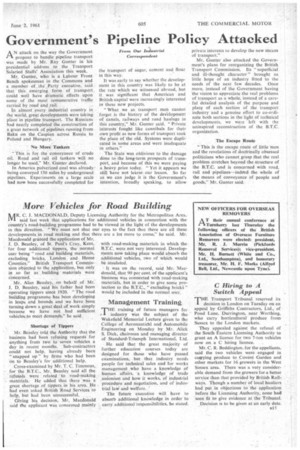Government's Pipeline Policy Attacked
Page 49

If you've noticed an error in this article please click here to report it so we can fix it.
From Our Industriai Correspondent
AN attack on the way the Government propose to handle pipeline transport was made by Mr. Ray Gunter in his presidential address to the Transport Salaried Staffs' Association this week.
Mr. Gunter, who is a Labour Front Bench spokesman in the Commons and a member of the Party executive: said that this emerging form of transport could well have dramatic effects upon some of the most remunerative traffic carried by road and rail.
In almost every industrial country in the world, great developments were taking place in pipeline transport. The Russians had nearly completed the construction of a great network of pipelines running from Baku on the Caspian across Russia to Poland and Hungary.
No More Tankers
"This is for the conveyance of crude oil. Road and rail oil tankers will no longer he used," Mr. Gunter declared.
In America pulverized coal was already being conveyed 150 miles by underground pipelines. Experiments on a large scale had now been successfully completed for
the transport of sugar, cement and flour in this way.
It was early to say whether the development in this country was likely to be at the rate which we witnessed abroad, but it was significant that American and British-capital were increasingly interested in these new projects.
"What we as transport men cannot forget is the history of the development of canals, railways and road haulage in this country," Mr. Gunter said. "Private interests. fought like cannibals for their own profit as new forms of transport took the place of the old. Systems were duplicated in some areas and were inadequate in others."
The State was oblivious to the damage done to the long-term prospects of transport, and because of this we were paying a heavy price today. "Yet it appears we still have not leirnt our lesson. So far as we can judge it is the Government's intention, broadly speaking, to allow private interests to develop the new means of transport."
Mr. Gunter also attacked the Government's plans for reorganizing the British Transport Commission. Its "superficial and ill-thought character" brought us little hope of an industry fitted to the needs of the next few decades. Once more, instead of the Government having the vision to appreciate the real problems of transport as a whole, instead of a careful detailed analysis of the purpose and place of each section of the transport industry and a genuine effort to co-ordinate both sections in the light of technical developments, we were left with the uninspired reconstruction of the B.T.C. organization.
The Escape Route "This is the escape route of little men and the revelations of doctrinally obsessed politicians who cannot grasp that the real problem stretches beyond the structure of the B.T.C. and is concerned with road, rail and pipelines—indeed the whole of the means of conveyance of people and goods," Mr. Gunter said,
















































































































































































